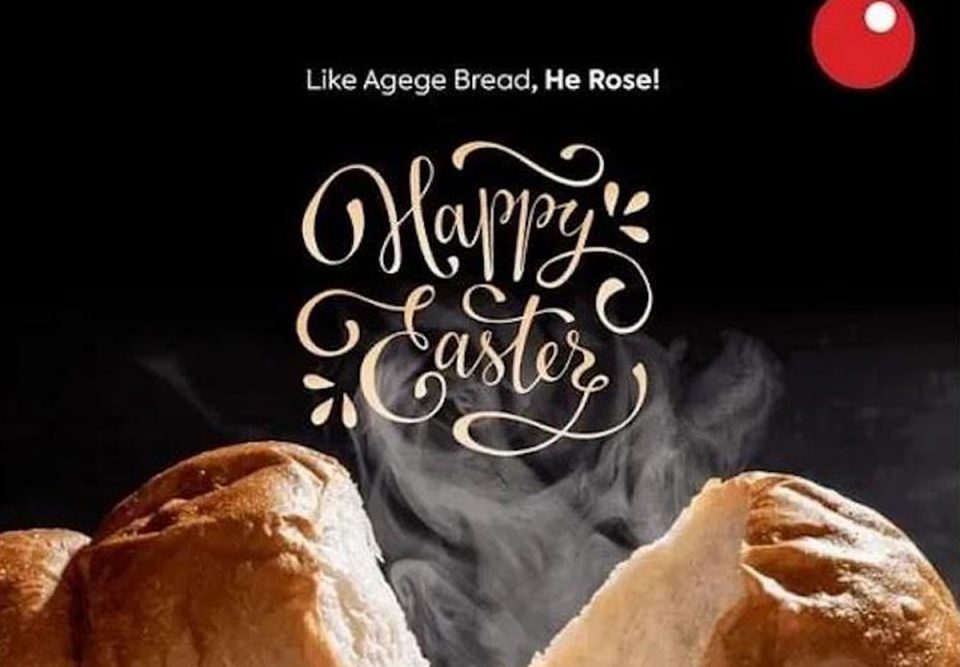The Easter day advert of Sterling Bank and the debate that trails the creative idea, considered a misrepresentation of the resurrection of the Lord Jesus Christ.
The furore generated by the Easter day advert of Sterling Bank has brought to the fore the banana peel that often confront the business of creatives anywhere in the world. In the said copy, which was published in major dailies on Sunday April 17, the bank had likened the resurrection of the Lord Jesus Christ to ‘Agege Bread’, a popular brand of bread that is very common in Agege, a suburb of Lagos.
As expected, many adherents of the Christian faith saw the copy as not just being offensive and insensitive; they also felt it was a denigration of the status of Jesus Christ, the symbol of the Christian faith all over the world.
“It was insensitive and unimaginable to liken the resurrection of our Lord Jesus Christ to Agege bread. I wonder what those behind the copy were thinking when they were conceptualising the advert,” Ezekiel Morakinyo, a pyramid marketer complained.
What was shocking was the fact that the copy must have passed through quite a number of approving persons; both on the side of the advertising agency that developed the copy and the client, which is the bank. That no one saw the negative reception that copy got was unimaginable. It was also strange that no one, on both sides, realised the comparison between Agege bread and Lord Jesus Christ would be offensive to adherents of the Christian faith.
In fact, many commentators on social media platform, Facebook, averred that if it had been the symbol of the Islamic faith that had been that compared, some fanatics would have taken to the street in serious protest.
Chido Nwakama, a marketing communications expert, in a very scathing rebuke of the bank, said every member of the bank’s corporate communications team should be sacked.
Perhaps, he had every reason to be livid as a professional. This was due to the fact that the bank did not deem it fit to apologise initially; saying: “Let the one who has never sinned throw the first stone.” It later issues an apology saying: “For our recent errors, we sincerely apologise. We humbly celebrate his resurrection, the defeat of death and the hope of salvation.”
Later, the Managing Director and Chief Executive Officer of the bank, Abubakar Suleiman, personally signed a public apology letter where he averred that the bank had no malicious intention in the said advert.
While the furore was understandable, the error also showed that creatives are a double edged sword that can either entertain and inform if you get them right and also put those behind them in a very serious and unpalatable situation if they don’t get it right. All over the world, there have been stories of offensive adverts that created a rather unwanted negative publicity for those behind such adverts. Coca-cola, the world’s leading soft drink brand, nearly got its fingers burnt when one of its copies were exposed in an Arab countries and the images were misinterpreted due to the fact that Arabic language is read from right to left unlike other languages. During the early days of GSM revolution in Nigeria, MTN rolled out ‘Mama Na Boy’ campaign, which recorded instant success but it soon became a burden on the brand. Analysts and feminists condemned it because it laid emphasy on the male child and underrated the girl child. The campaign ended up giving both the brand and its spin-doctors some sleepless nights.
The body charged with regulating advertising practice in the country, the Advertising Practitioners Councild of Nigeria (APCON) had waded into the matter. In a statement signed by its Registrar and Chief Executive Officer, Dr. Lekan Fadolapo, the Council said the controversial advert copy was not approved by the Council.
“The distasteful advertisement was neither submitted nor approved for exposure by the Advertising Standards Panel (ASP) the statutory panel charged with the responsibility of ensuring that advertisements conform with prevailing laws of the federation as well as code of ethics of advertising in Nigeria,” the Council stated.
But reacting to the APCON position, an analyst, Samuel Ajayi, was of the opinion that the regulatory body did not have enough moral justification to take Sterling Bank and the agency behind the copy up.
He said: “From all indications, APCON was actually reacting to public outcry over the copy and not that the Council was actually being proactive. So many copies have been exposed without the approval of the Council and have not been able to do anything to it. Perhaps, if there had not been public outcry over the offensive advert, APCON would have been silent as usual.”
In a similar way, the Christian Association of Nigeria (CAN) appeared to have yielded to pressure from many Christians, who have consistently called for the removal of the bank’s MD. In a statement, CAN dismissed the apology of the Chief Executive of Sterling Bank, Abubakar Suleiman and the bank, saying it did not come from a “penitent heart”, and called for Suleiman’s removal as CEO.
CAN, which is the umbrella body of Nigeria’s Christian community, called the advert “blasphemous” and “insulting”.
“In case the management of the Sterling Bank is not aware, the resurrection of Jesus witnesses the immense power of God Himself. To believe in the resurrection is to believe in God. If God exists, and if He created the universe and has power over it, then He has power to raise the dead,” CAN said.
Expectedly, the position of the religious body has generated debate, from those who shared their sentiments and others who felt the reaction was not Christ like. Whichever way, Sterling Bank still remains in the news, albeit for the wrong reason. Perhaps tomorrow, the CEO of the creative agency that handled the campaign may also be dragged online or be asked to resign too.




